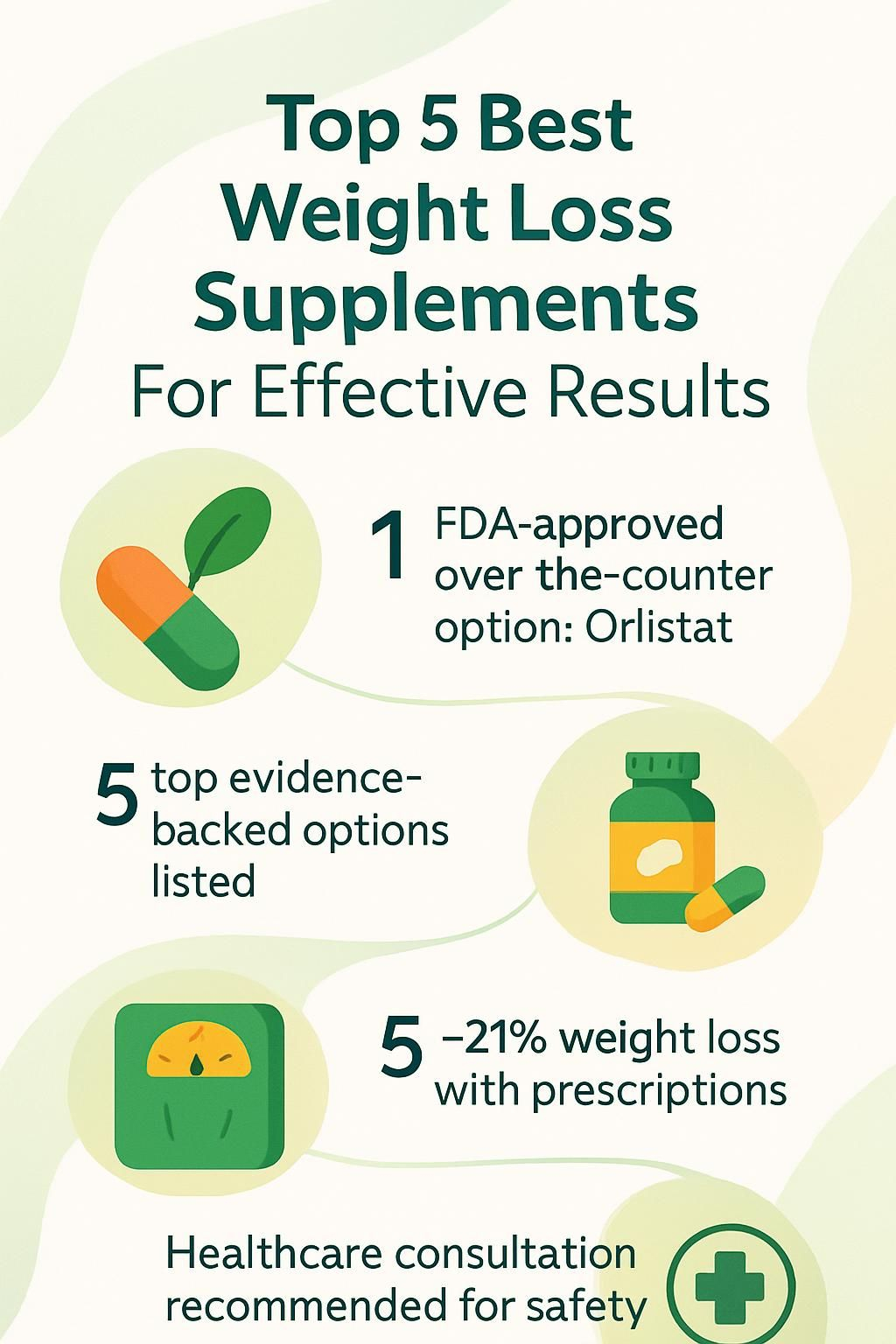Top 5 Best Weight Loss Supplements For Effective Results
Our Nutrition Assistant AI Suite will transform your body. You will lose fat, get toned, and build muscle. Gain confidence and optimal health.
If you are working hard to lose weight, it can be tough to know which products actually help. Many people reach for weight loss supplements to speed results. These products are sold without the same Food and Drug Administration, FDA, review required for medicines.
This guide explains how common ingredients, such as green tea extract and glucomannan, may support weight management, what safety risks to consider, and how to choose a product wisely. You will also learn how to pair any supplement with diet and exercise for better results.
Use this article to get clear, honest answers before you buy or use a dietary supplement. This content is educational and is not medical advice. Always talk with your healthcare provider about your personal plan.
Key Takeaways
- Orlistat, Alli, is the only FDA approved over the counter weight loss supplement. It blocks about 25% of dietary fat and supports modest results in adults and teens aged 12 and up.
- Green tea extract, glucomannan, caffeine based supplements, probiotics, and Orlistat are five options with some research support. They work best with a healthy diet and regular exercise.
- Most supplements lead to small or short term changes in body weight. Prescription anti obesity medicines average about 5% to 21% weight loss in clinical trials through 2023.
- Talk with a healthcare professional first. Supplements may interact with prescription drugs or worsen conditions such as high blood pressure or diabetes.
- Dietary supplements are not reviewed by the FDA before sale. Choose third party tested brands and set realistic expectations based on current research.

Important Factors Before Choosing Weight Loss Supplements

Supplements for weight loss can be helpful, but your choice affects safety and results. A little homework up front protects your health and your wallet.
Why should I consult a healthcare professional before using supplements?
Supplements can interact with medicines and with your health conditions. The FDA does not regulate dietary supplements as tightly as over the counter or prescription drugs, so some products may contain hidden active ingredients.
Only a qualified clinician can review your medical history, current prescriptions, and lab values to lower your risk of side effects such as high blood pressure, fast or irregular heart rate, seizures, or liver injury.
Your doctor needs a full list of every supplement you take before starting any new medication.
Extra caution is needed if you are pregnant, breastfeeding, or living with obesity, diabetes, or heart disease. Clinicians often use trusted sources such as the National Center for Complementary and Integrative Health and the Mayo Clinic to guide safe choices.
Be open about all products you use, including herbal items. This is crucial if you also use anti obesity medications, AOMs, such as Orlistat, Alli, GLP-1 shots like tirzepatide, or products that contain stimulants such as bitter orange or past ephedra blends.
What are the potential side effects and interactions of weight loss supplements?
Liver injury, allergic reactions, and drug interactions can occur with weight loss supplements. Some products have been found to contain undisclosed prescription drugs. Hidden ingredients raise the risk of heart attack, stroke, or seizures.
Ephedra, ma huang, was banned in the United States after reports of arrhythmia, severe mental changes, and deaths. Bitter orange contains synephrine, a stimulant. It may raise blood pressure and heart rate, and the risk is higher when combined with other stimulants.
Some fibers reduce how well your body absorbs medicines. Glucomannan can block oral drugs if taken at the same time as your pills. High doses of chromium picolinate may stress the kidneys and can cause headaches or trouble sleeping.
Caffeine heavy pills may cause nervousness, upset stomach, palpitations, fatigue, and poor sleep. I felt several of these symptoms after a high dose caffeine tablet during college while trying to burn more calories for weight control.
Compounded versions of GLP-1 medicines sold online are not FDA approved. Health agencies and poison centers have received many reports of adverse events linked to these products.
Call your clinician if you develop abdominal pain, vomiting, constipation, rash, swelling, or other unusual symptoms while using any supplement.
How can I combine supplements with diet and exercise effectively?
Supplements work best as one small piece of a full plan. Start with a healthy eating pattern and regular movement, then add a supplement if needed.
- Talk with your healthcare provider before you start any product, especially if you have hypertension, take medicines, or live with obesity.
- Use FDA approved anti obesity medications only under medical guidance.
- Match the supplement to your goal. For example, glucomannan for appetite control, caffeine based products for energy, or green tea extract for fat metabolism support.
- Keep eating a nutrient dense diet with fiber, protein, fruits, and vegetables. This supports fullness and steady energy.
- Stay active. Physical activity works with supplements to raise calorie burn and support fat loss.
- Set practical expectations. Research shows supplements provide small changes compared with diet and exercise alone.
- Watch for nausea, dizziness, or blood pressure changes. Stop the product and call your clinician if symptoms appear.
- Track progress with weight, waist size, and fitness milestones. Do not rely on hunger feelings alone.
- Avoid high doses and do not stack multiple stimulants. Some ingredients can dangerously raise heart rate.
- Choose third party tested brands for quality and purity.
Supplements can support appetite, energy, and cravings. They should not replace smart eating and regular movement.
How do I set realistic expectations for supplement results?
Supplements may help you lose a few pounds, but most people see modest or short term changes. Prescription anti obesity drugs often lead to 5% to 21% average weight loss in trials. Supplements are less powerful and results vary.
If you do not lose at least 5% of your starting weight after 12 to 16 weeks, the product likely is not effective for you. Alli, Orlistat, is the only FDA approved over the counter option that reduces fat absorption.
Popular items such as green tea extract, probiotics, and apple cider vinegar do not show consistent, clinically meaningful weight loss in strong studies. Most people regain lost weight if they stop medication or supplements and also stop healthy habits.
Treat supplements as a small tool inside a larger plan. The next section explains the main ways these products are supposed to work in your body.
How Weight Loss Supplements Help You Lose Weight
Supplements may help in four ways. They can reduce appetite, raise metabolism, block some fat absorption, or improve energy. Knowing which action you need makes it easier to choose.
How do supplements suppress appetite?
Some ingredients help you feel full. Glucomannan is a soluble fiber from the konjac root. It absorbs water and forms a gel in your stomach. That gel adds volume, which may reduce how much you eat.
Prescription drugs, such as liraglutide, semaglutide, naltrexone bupropion, and phentermine topiramate, target hormones that control hunger. They strengthen satiety signals in the brain and reduce cravings.
Hoodia is a plant that has been promoted for appetite control, but strong safety and effectiveness data are lacking. Capsaicin from chili peppers may help people feel fuller after meals. Evidence for green tea extract as an appetite aid is mixed.
Many over the counter products claim appetite control. Few have high quality, placebo controlled research behind them. Get medical advice first, especially if you have high blood pressure or a fast heart rate.
Can supplements boost metabolism for weight loss?
Some supplements claim to speed up your metabolism, which means your body burns more calories at rest. Caffeine, green tea extract, and capsaicin show small increases in calorie burn in some studies.
7 keto DHEA has limited evidence for a metabolic effect. Carnitine helps the body turn fat into energy during exercise. Bitter orange contains synephrine, a stimulant that may raise metabolic rate. Safety concerns are greater with stimulants. Chromium picolinate is marketed for calorie burning and muscle building, but reviews find no meaningful effect on metabolism or weight.
Guar gum has not shown consistent benefits for fat loss and is often labeled possibly ineffective.
How do supplements block fat absorption?
Orlistat, Xenical or Alli, reduces fat absorption in the gut. It blocks lipase, an enzyme that breaks down dietary fat. Undigested fat is not absorbed and leaves the body in stool.
Orlistat is FDA approved. The prescription dose is 120 mg. The over the counter dose is 60 mg. Other ingredients, such as chitosan and guar gum, claim to block fat but lack strong evidence. Chitosan may cause stomach upset, and people with shellfish allergies should avoid it.
Fat blockers can reduce absorption of fat soluble vitamins A, D, E, and K. A multivitamin taken at a separate time may be needed. I tried chitosan once and had mild cramps without any noticeable change in appetite or weight.
In what ways do supplements enhance energy levels?
Caffeine, green coffee extract, and green tea extract stimulate the central nervous system. This can increase alertness and help you feel more ready to exercise. Some people also notice less hunger for a short time after they use caffeine.
Carnitine supports energy production by helping fat move into the cell’s energy centers, the mitochondria. Chromium is often marketed for energy, but recent reviews do not show clear benefits. Bitter orange is a stronger stimulant with higher safety risks, including palpitations and elevated blood pressure. Ephedra was removed from the market due to heart risks.
Be careful with any stimulant. Stacking products raises the chance of headaches and poor sleep without better weight loss.
Top 5 Best Weight Loss Supplements for Effective Results
Green tea extract, glucomannan, probiotics, Orlistat, Alli, and blends with B vitamins plus caffeine are often used to support weight loss. Orlistat is the only item on this list with FDA approval for over the counter use.
Green tea extract may raise calorie burn. Glucomannan is a natural fiber that can help you feel full longer. Probiotics may support gut health and could help prevent weight regain for some people. Caffeine blends can improve energy for workouts.
These products target different parts of your biology. Some reduce appetite or block fat absorption. Others help you stay active by boosting energy. Stimulant blends may interact with prescription drugs such as monoamine oxidase inhibitors or blood pressure medicines. Always check with your clinician first.
I learned the hard way that no pill replaces a healthy plate. Green tea extract gave me a small energy lift, but steady progress came from tracking meals and moving more. Prescription anti obesity medicines still deliver stronger average results in trials through 2023.
Treat supplements as part of a full plan that includes smart nutrition, regular activity, essential vitamins and minerals, and support from your healthcare team.
Green Tea Extract
Green tea extract is a popular choice for weight management. It contains caffeine and catechins, plant compounds with antioxidant activity. Some research suggests it may support fat burning and a slightly higher metabolism.
What are the features and benefits of green tea extract?
You can buy green tea extract as capsules, powders, or brewed teas. It combines caffeine with catechins. Together, they may reduce appetite a bit and support calorie burning. Many users notice a mild energy boost.
Because it is common and affordable, you will find it in many over the counter blends that target fat loss. It is also used by people who want antioxidant support while working on weight control.
What are the pros and cons of green tea extract?
Green tea extract is widely used for its potential to support metabolism and provide antioxidants. Review the benefits and limits below.
| Pros | Cons |
|---|---|
|
|
During my own cut, green tea extract offered a small dip in appetite and a light energy rise. Taking it late in the day kept me up at night, so morning doses worked better. It pairs best with a balanced diet and planned exercise.
Glucomannan
Glucomannan is a prebiotic fiber that supports fullness and digestion. It can be a gentle tool for appetite control inside a structured plan.
What are the features and benefits of glucomannan?
Glucomannan is a soluble fiber that absorbs water and expands in your stomach. That expansion may help you feel full and reduce daily calories. Early studies show modest benefits for weight loss in some people.
It also feeds healthy gut bacteria and supports regularity. You can buy it as a powder or capsule, and you can eat it in foods like shirataki noodles. It does not act like a stimulant, so it avoids jittery side effects common with caffeine products.
What are the pros and cons of glucomannan?
Review both sides before you decide if glucomannan fits your plan.
| Pros | Cons |
|---|---|
|
|
Caffeine-Based Supplements
Caffeine based supplements can raise energy and metabolism for a short time. Used smartly, they can support your diet and exercise routine.
What are the features and benefits of caffeine-based supplements?
Caffeine products come as pills, powders, ready to drink beverages, and blends with other ingredients such as green tea extract. They are low cost and easy to find.
People use them to increase alertness and energy expenditure. Some also notice a short lived drop in appetite. Taking caffeine before a workout may raise stamina and help you burn more calories.
Some prescription weight control medicines use similar stimulants under medical supervision. My best results came from a simple caffeine pill before morning walks. The extra spark made it easier to stay consistent on low energy days.
Research suggests caffeine can raise energy expenditure by about 3% to 11% in adults. Plain capsules avoid extra sugars that come with flavored drinks.
What are the pros and cons of caffeine-based supplements?
Caffeine helps many people feel alert and ready to move. It also has limits and risks. Compare both sides below.
| Pros | Cons |
|---|---|
|
|
A friend used a caffeine fat burner before workouts and loved the energy, but sleep suffered and headaches appeared on busy weeks. Keep your dose modest and avoid late day use.
Next, explore how probiotics may aid weight management.
Probiotics for Weight Management
Probiotics support gut health, which may influence weight over time. Think of them as helpers for your digestive system rather than quick fat burners.
What are the features and benefits of probiotics for weight loss?
Probiotics come as capsules, powders, and fermented foods such as yogurt. They add beneficial bacteria to your gut. Some studies suggest a small benefit for weight control when used consistently.
Certain strains appear to support metabolism by improving gut balance. Many people report better regularity and less bloating after starting probiotics. These products may also support immune function and fit well in a broader weight plan.
Most healthy adults tolerate probiotics well when following the label and getting medical advice first. My experience was fewer stomach issues and steadier energy during workouts while eating balanced meals.
Check the pros and cons before you start a new probiotic routine.
What are the pros and cons of probiotics for weight loss?
Probiotics are usually safe for most adults. They can support a healthy gut and are easy to add to a daily routine. Some brands also include oral health strains.
That said, strong weight loss results have not been shown across studies. No probiotic has FDA approval for weight loss. Quality varies widely, since many products lack third party testing for purity and dose. Mild gas or bloating can occur, especially at the start or when mixed with other stimulants.
Orlistat (Alli)
Orlistat, Alli, is an FDA approved option that blocks some fat absorption. Learning how it works and how to use it safely will help you decide if it fits your plan.
What are the features and benefits of Orlistat (Alli)?
Orlistat is a non stimulant medicine approved for weight loss. It is the only over the counter product with FDA approval in this category. That makes it different from supplements sold without review.
Alli blocks about one quarter of the fat you eat from being absorbed. The undigested fat passes out of the body. Adults and teens aged 12 or older may use it, though teens need medical supervision. The over the counter dose is 60 mg. The 120 mg version, Xenical, is prescription only.
Used with diet and exercise, Orlistat leads to small but meaningful weight loss for many people. It may also lower LDL cholesterol, since less fat is absorbed.
What are the pros and cons of Orlistat (Alli)?
Alli has strong safety and efficacy data compared with common supplements. It is stimulant free, so it can be used longer term if tolerated. Benefits include modest weight loss and improved cholesterol when taken with meals that contain fat.
Common downsides include oily stools, gas, and urgent bowel movements. Orlistat reduces absorption of fat soluble vitamins A, D, E, and K, so a multivitamin taken at a different time of day is often advised. Effectiveness is usually less than newer GLP-1 medicines. It should not be used during pregnancy.
Other Effective Ingredients to Consider
Some ingredients may offer extra support. Use them with care and realistic expectations.
Capsaicin
Capsaicin is the compound that makes chili peppers hot. It can increase heat production in the body, a thermogenic effect. This may raise daily calorie burn slightly and reduce appetite in some people.
You can buy capsaicin in capsules or as part of multi ingredient blends. It is not FDA approved for weight loss. Sensitive stomachs may notice irritation or discomfort. Benefits for actual weight change are limited in current studies.
Carnitine
Carnitine is found in meat and dairy. It helps move fat into cells to be used for energy, especially during exercise. Some users feel better exercise performance, but research on weight loss is mixed.
Carnitine is not FDA approved for weight loss. Possible side effects include stomach upset and diarrhea. Set practical expectations and pair it with diet and regular activity.
Chromium Picolinate
Chromium picolinate is a mineral supplement promoted for appetite control and calorie burning. A review of 24 studies using 200 to 1,000 micrograms per day found no meaningful weight loss benefit.
Keep intake below 35 micrograms per day from supplements unless a clinician advises otherwise. High doses may harm the kidneys or cause headaches, insomnia, or irritability. It appears in many blend formulas and has no FDA approval for weight loss.
Key Safety Tips for Using Weight Loss Supplements
Smart safety steps help reduce risk while you test what works for you. Start low, go slow, and keep your clinician in the loop.
Why should I avoid overuse or high doses of supplements?
High doses raise the chance of side effects. Too much caffeine can cause headaches, poor sleep, and heart rhythm problems. Large amounts of chromium picolinate may stress the kidneys.
Ephedra showed how excessive stimulant use can be dangerous for the heart. Bitter orange may be unsafe at higher doses. Fiber products and Orlistat can trigger cramping or diarrhea if you overdo it. More is not better with supplements.
How do I choose third-party tested supplement brands?
Pick brands that use third party testing for purity and potency. Look for seals from USP, NSF International, or ConsumerLab.com. These groups verify that what is on the label is in the bottle and screen for contaminants.
Read labels closely. Reliable products list all ingredients and avoid miracle claims. Because the FDA does not pre approve supplements, independent testing adds a layer of protection. Federal resources such as the Office of Dietary Supplements and the National Center for Complementary and Integrative Health offer unbiased guidance.
Ordering a supplement without checking certification taught me a lesson. The product listed extra additives I did not want, so now I always check for a quality seal.
What signs of adverse reactions should I monitor?
Watch for yellowing skin or eyes, severe abdominal pain, rash, swelling, or ongoing digestive problems. These can point to liver injury or an allergy.
Pay attention to your heart. A fast pulse, chest pain, blood pressure swings, pounding heartbeat, headaches, dizziness, poor sleep, or agitation mean you should stop the product and seek medical advice.
Serious reactions have occurred with some compounded GLP-1 products and with stimulants such as bitter orange. Call your clinician right away if you notice severe symptoms or if you take other prescription medicines.
How Healthy Lifestyle Choices Support Weight Loss
Healthy habits are the foundation. Supplements may add a small boost, but your daily routine does most of the work.
Why are diet and exercise the foundation of weight loss?
The 2020 to 2025 Dietary Guidelines show that nutrition and movement drive weight change. A balanced diet controls calories and fuels your needs. Regular exercise increases daily burn and supports muscle.
Supplements and anti obesity medicines work best alongside these habits. Long term success comes from a consistent calorie deficit and steady activity, not from products alone. These changes also improve blood pressure, cholesterol, and energy.
How do stress management and sleep quality affect weight loss?
Stress and sleep strongly affect hunger and choices. Managing both can make your plan feel easier and more sustainable.
- Chronic stress raises cortisol, a hormone that drives cravings for high calorie foods.
- Poor sleep lowers leptin, which signals fullness, and raises ghrelin, which triggers appetite.
- Too little sleep slows metabolism and reduces daily calorie burn.
- High stress can lead to emotional eating and skipped workouts.
- Sleep loss is linked to weight regain after early progress.
- Use mindfulness, brief walks, or breathing drills to ease daily stress.
- Keep a consistent sleep schedule to support hormone balance and muscle recovery.
- Clinicians often target stress and sleep as core steps in weight plans.
- After I stopped scrolling at bedtime, late night snacking dropped and morning workouts felt easier.
- A simple journal for stress triggers and sleep times gives you data to share at check ins.
- Better sleep and lower stress improve results from diet, exercise, and supplements.
Conclusion
Choosing the best weight loss supplement starts with clear goals and safe habits. Green tea extract, glucomannan, caffeine blends, probiotics, and Orlistat can support your work, but benefits are usually modest. Orlistat stands out as the only FDA approved over the counter option.
Talk with your healthcare provider before starting any supplement, especially if you take prescription medications or have a medical condition. The strongest results still come from a healthy diet and regular exercise, with supplements used as a careful add on.
For trustworthy guidance about dietary supplement safety and ingredients, visit the U.S. Office of Dietary Supplements and the National Center for Complementary and Integrative Health.
FAQs
1. What are the top 5 best weight loss supplements for effective results?
The leading options include green tea extract, glucomannan fiber, conjugated linoleic acid (CLA), caffeine-based products, and orlistat. Each has been studied for its impact on metabolism or fat absorption. For example, a clinical trial published in Obesity Reviews found that green tea extract can help increase calorie burning by about 4 percent over a 24-hour period.
2. Are these weight loss supplements safe to use?
Most of these supplements have undergone safety reviews in scientific studies; however, side effects may occur depending on individual health conditions and dosages used. Caffeine-based products can cause increased heart rate or sleep problems if taken late in the day. It is important to consult with a healthcare provider before starting any supplement regimen.
3. How do I know which supplement will work best for me?
Choosing the right product depends on your health status and goals. For instance, those sensitive to stimulants might avoid caffeine-based options while individuals seeking appetite control could consider glucomannan fiber instead. My own experience showed better results when I combined dietary changes with green tea extract rather than relying solely on pills.
4. Do weight loss supplements guarantee long-term success?
No supplement guarantees lasting results without lifestyle changes such as improved diet and regular exercise routines; research from The American Journal of Clinical Nutrition highlights that combining healthy habits with supplementation leads to greater sustained weight management compared to using pills alone.
Summary: Green tea extract, glucomannan fiber, CLA, caffeine-based products, and orlistat rank among the most researched choices for supporting weight loss efforts when paired with healthy living strategies.







